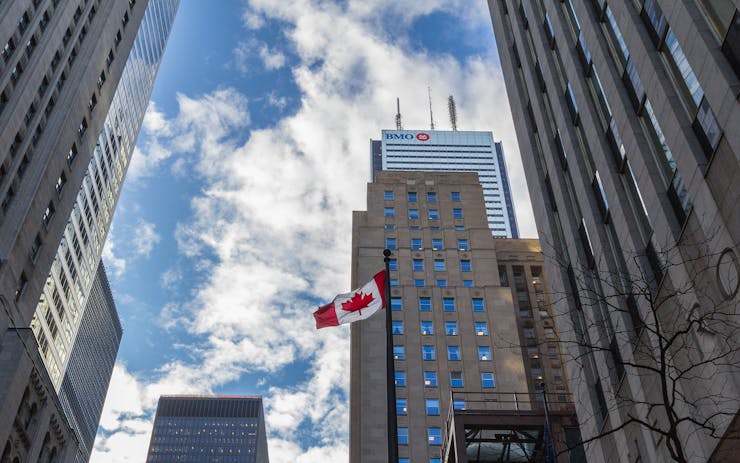When Canopy Growth reached a financing deal with the Bank of Montreal (BMO) in January, it was a big step for both the licensed producer and for Canada’s financial sector. The deal signaled a shift in this country’s banking industry: It’s five biggest banks are finally warming up to the cannabis industry.
With Canada’s recreational cannabis sales expected to reach $6 billion within three years, the industry is presenting big banks with an opportunity that some see as too good to pass up.
The banks have been skittish about getting involved in the industry, despite its dramatic growth in recent years, in large part because they have major business interests in the US, where cannabis is outlawed federally. (Cannabis for recreational or medical use is legal in many states but classified as an illegal Schedule-I narcotic under US law.)
But with Canada’s recreational cannabis sales expected to reach $6 billion within three years, surpassing the $1.3-billion estimate for the mature medical cannabis market, the industry is presenting big banks with an opportunity that some see as too good to pass up.
In January, BMO became the first of the “Big Five” to get involved in cannabis industry financing when it teamed up with a smaller financial services firm to co-lead a $175-million “bought deal” for the licensed cannabis producer Canopy Growth. (In a bought deal, the investment bank commits to buy securities from the issuer with the aim of selling them to investors.)
Two months later, BMO’s investment banking subsidiary, BMO Nesbitt Burns, joined the same financial services firm to co-lead a $100-million bought deal for the licensed cannabis producer Cronos.
When contemplating involvement with a cannabis company, the Bank of Montreal looks at the quality of the company and the reputational risk of getting involved with it.
BMO chief executive officer Darryl White discussed those developments after the bank’s annual shareholders’ meeting in April. When contemplating involvement with a cannabis company, White said, the bank looks at the quality of the company and the reputational risk of getting involved with it. BMO also ensures there is no “nexus” to the US, he added. “If it passes all those tests, what is the argument against?”
BMO also designated an analyst to cover the cannabis industry in April and has announced plans to hold its first cannabis conference in late May.
The chief executive officers of some of Canada’s major licensed producers, including Aphria, Aurora, Canopy Growth, Cronos, and MedReleaf, will make presentations at the conference. The head of Hiku Brands Company, which owns seven coffee shops in Canada and hopes to open more to serve the cannabis community, will also appear.
Last October, Bloomberg reported that BMO provides accounts to at least a dozen companies and investment firms in the cannabis space.
Two days after BMO announced its investment in Canopy Growth, the Canadian Imperial Bank of Commerce (CIBC), revealed that it had led a $20-million credit facility (a variety of loans) to MedReleaf nine months earlier.
Like BMO, the Toronto–Dominion (TD) Bank is also thought to be providing business accounts to cannabis producers—at least nine of them.
Toronto–Dominion Bank’s CFO confirmed that the bank wouldn’t enter into a financing deal with a company with US exposure.
The T-D Bank’s chief executive officer, Bharat Masrani, said he looks at the pending legalization of recreational cannabis as “an important data point” and said the bank might consider financing arrangements in the future. He also added that his bank wouldn’t enter into a financing deal with a company with US exposure.
The Bank of Nova Scotia (Scotiabank) and Royal Bank of Canada (RBC) have both turned their back on the cannabis sector in the past, even closing accounts of those in the industry. But they might soon reconsider.
Scotiabank says it has adopted a wait-and-see approach, emphasizing that its priority is to “manage risk.” Although RBC doesn’t provide services to companies that produce or distribute cannabis, spokesman AJ Goodman says the bank is reviewing its policies.
Given recent developments, it seems likely that Canada’s biggest banks will become more involved in the cannabis sector in the coming months and years.
Aaron Salz, who is head of Stoic Advisory, a corporate finance advisory firm that works with cannabis companies, says these banks make their money from corporate banking (financing, cash management and other banking services for corporations)—so the CIBC’s involvement with MedReleaf represents a big step forward in the relationship between Canadian banks and the cannabis industry.
“I think we will see more of this in the coming year,” he told Leafly, “more lines of credit, debt solutions and that kind of thing. It started with capital markets and that has led to change.”
Canada’s cannabis industry is relatively small right now but banks are thinking long-term, Salz said. “They recognize that this is an emerging international business and they want to get involved early so they can be meaningful players in the industry 10 or 20 years down the road.”





